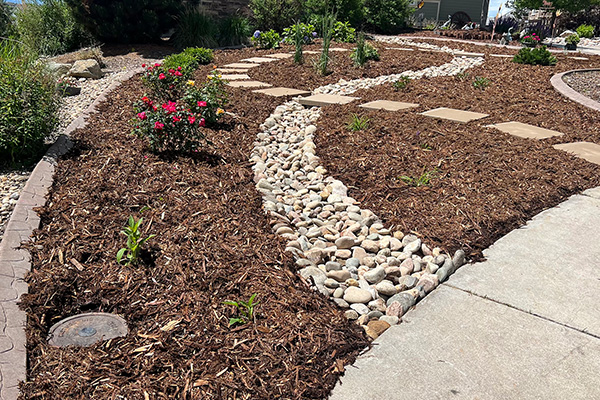Sustainable Landscape Design Blog
.jpg)
Outside Dreams is a leading sustainable landscape design company based in the Highlands Ranch and surrounding areas. Sustainable landscape design creates outdoor spaces that are both attractive and functional while conserving resources. By incorporating drought-tolerant plants, efficient irrigation systems, and xeriscaping principles, these landscapes thrive with less water and upkeep. Homeowners benefit from reduced water consumption, lower utility bills, and decreased maintenance demands, all while supporting local ecosystems and increasing their homes’ curb appeal. A sustainable yard is not just environmentally responsible—it’s cost-effective, practical, and beautiful.
Key Components of Sustainable Landscape Design
Innovative Landscape Design: Water-wise landscape design includes well-thought-out site planning, grouping plants with similar water needs into hydrozones, removing high-water-use turf such as bluegrass, using mulch to retain soil moisture, and lowering yard maintenance.
Native and Drought-Tolerant Plants: Well-planned plantings can create attractive outdoor spaces, add color throughout the year, and reduce yard maintenance. Using native species ensures that each plant acclimates to our local climate, elevation, and soil conditions. These plants require less water, are more resilient to Colorado’s weather extremes, and provide valuable habitat for pollinators and local wildlife. Examples include hardy perennials, ornamental grasses, and colorful wildflowers that thrive in arid conditions. Knock Out Roses add color and are considered a landscaping or shrub rose in the Floribunda style. They are disease-free, drought-tolerant, extremely hardy, and amazingly floriferous, producing copious amounts of flowers all summer. Another way to minimize turf grass and yard maintenance is planting tapestry lawns—a mix of diverse, low-growing ground covers like clover, sedum, and creeping thyme. Outside Dreams has a list of plants, shrubs, and trees with a proven record in sustainable landscapes.
Employing Efficient Watering Methods: Americans apply more than 7 billion gallons of water a day to landscapes during the summer months. Yards with sustainable landscapes would use this water more wisely. Stormwater runoff is often viewed as a waste product and removed instead of being captured and used for watering.
Employing xeriscaping principles helps minimize or even eliminate the need for supplemental irrigation, which in Denver’s semi-arid environment can reduce outdoor water usage by 60 percent or more. This approach not only emphasizes drought-tolerant plantings but also incorporates strategies such as rain gardens and stormwater-capture systems that lowers runoff. Sustainable yards use drip irrigation, weather-based controllers, and moisture-sensor technologies to ensure that water is applied only where and when it’s needed, cutting waste, lowering utility bills, and keeping landscapes healthier by avoiding the stress of drought or overwatering.


Soil Health Enrichment: Soil is more than just dirt; it’s a powerful force in sustaining plant life, supporting invertebrate and insect life, and maintaining clean water systems. Healthy soil absorbs rainfall, reduces flooding, filters pollutants, and nourishes the organisms that enrich it. It takes over 500 years to form just one inch of topsoil. Protecting this vital resource is crucial, and sustainable gardening practices can help preserve and improve soil for future generations. Enhancing Denver’s often heavy, clay-based, and high-pH soils with organic matter such as compost and mulch improves soil structure, aeration, nutrient availability, and moisture retention, helping plants thrive while reducing the need for synthetic fertilizers.
Energy-efficient Landscapes: Energy-efficient landscape design reduces a home’s overall energy demands by using natural systems and technology. Strategically placed shade trees and windbreaks help lower cooling needs in the summer and reduce heating demands in the winter, while cutting utility costs. Adding LED landscape lighting further enhances efficiency by minimizing electricity use, resulting in a visually appealing outdoor environment. Outside Dreams is the leading landscape lighting contractor in the Highlands Ranch and surrounding areas.
Supporting Pollinators: About 90 percent of wild flowering plants and nearly 100 different food crops in the U.S. rely on biotic pollination. Biotic pollination is the process of pollen transfer between flowering plants that insects, birds, bats, and other animals facilitate. Creating a pollinator garden provides essential nutrients for bees and other pollinators.
Homeowners interested in saving water and lowering maintenance around their homes should call (303) 359-9533 or click here to fill out a service request form.